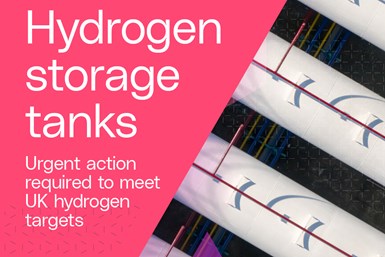Workforce report provides insight into evolving hydrogen landscape
The National Composites Centre and Tank Storage Association identify future skills demands, call for action to meet U.K. hydrogen targets.
Urgent action is needed in order for the U.K. to meet the government’s target to increase hydrogen production, according to a new Workforce Foresighting Hub report. The report, sponsored by the Tank Storage Assn. and led by the National Composites Centre (Bristol, U.K.), in collaboration with the Hydrogen Skills Alliance, was carried out to identify future skills demands to be addressed to meet the challenge of increasing hydrogen production. It identifies future supply chain capabilities, future occupational profiles and suggested changes to current training provisions to deliver the skills needed for its wholesale adoption.
According to the report, without action now, it is likely that the capabilities and capacity of the workforce will be insufficient to meet the needs for achieving the government’s targets — to deliver up to 10 gigawatts (GW) of hydrogen production capacity by 2030, with at least half of it coming from electrolytic hydrogen.
The report focuses specifically on above-ground hydrogen storage tanks, which are critical in all aspects of bulk storage, distribution and commercial hydrogen use and are applicable across many sectors. However, concerns about skills gaps in design, installation, maintenance and operation threaten to impede progress in this critical area.
The Workforce Foresighting Hub report is part of the Workforce Foresighting Hub program, an Innovate UK initiative that brings together domain specialists, educators and employers across innovative technologies to deliver individual “foresighting cycles” on specific challenges. By assessing capability needs and identifying gaps in current skills development, the goal is to support the education and training sector to effectively drive action within each individual challenge.
Output reports from each cycle detail future supply chain capabilities, prototype future occupational profiles and deliver recommendations to drive action to ensure that the U.K. continues to harness the potential of innovative technologies.
“As a zero-carbon fuel source, hydrogen will play a key role in helping the U.K. reach our net-zero goals, but if we don’t have the skilled workforce to exploit this, we won’t be able to use it to its full potential,” Peter Davidson, chief executive of the Tank Storage Assn. “While there is a lot of work to do, the process allows us to identify specific actions at an early stage, meaning we have the time and the recommendations needed to help us improve the capabilities of the workforce.”
View the complete report here.
Related Content
-
Collins Aerospace to lead COCOLIH2T project
Project for thermoplastic composite liquid hydrogen tanks aims for two demonstrators and TRL 4 by 2025.
-
Recycling hydrogen tanks to produce automotive structural components
Voith Composites and partners develop recycling solutions for hydrogen storage tanks and manufacturing methods to produce automotive parts from the recycled materials.
-
Honda begins production of 2025 CR-V e:FCEV with Type 4 hydrogen tanks in U.S.
Model includes new technologies produced at Performance Manufacturing Center (PMC) in Marysville, Ohio, which is part of Honda hydrogen business strategy that includes Class 8 trucks.
















